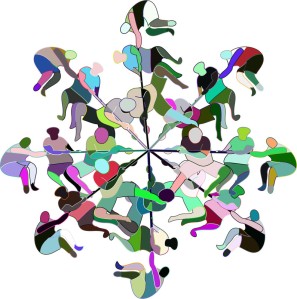 It’s been hard to read the news and blogs this week. I’ve been sucked into reading comment sections full of vitriol and spite and rage – not far removed from the emotions that drove a man to kill 4 men and 2 women in California this week. It is only through blogging that I’ve become aware of all the hatred that thrives on this medium of spurious anonymity. I’ve seen the hashtag campaigns, I’ve read a lot of feminist and men’s rights blogs. The tactics, name-calling and dogma are right out of a bipartisan political playbook. We are our own worst enemies.
It’s been hard to read the news and blogs this week. I’ve been sucked into reading comment sections full of vitriol and spite and rage – not far removed from the emotions that drove a man to kill 4 men and 2 women in California this week. It is only through blogging that I’ve become aware of all the hatred that thrives on this medium of spurious anonymity. I’ve seen the hashtag campaigns, I’ve read a lot of feminist and men’s rights blogs. The tactics, name-calling and dogma are right out of a bipartisan political playbook. We are our own worst enemies.
I don’t talk much about feminism, because there are plenty of people who have taken and twisted it into whatever suits their purpose in the moment. People write blog post after blog post telling us what it is and isn’t. Some men’s blogs have entire forums dedicated to insulting anyone who calls themselves a feminist. The latest backlash includes women proudly proclaiming that they are not feminists. That’s a whole lot of insecurity on parade.
Having been very young and very stupid once, I remember when I thought gender didn’t matter. I blundered through life like that. I thought periods sucked. I didn’t want to get married or have kids. I dated a lot of men people. But I am not beautiful by society’s standards (although I’ll be excited when knock knees and having no chin comes into fashion) and someone once told me that I walked like I was getting ready to kick someone’s ass. Apparently these things in combination insulated me against much of the everyday misbehavior about which many women have posted.
That being said, I’ve been called a whore in the middle of a party. I’ve been called a bitch by male coworkers. I discovered disparate pay situations for equal work. I worked harder than most of my fellow soldiers only to be looked askew at by military wives. Believe me, your husband smelled like dirty sweat socks in the field and so did I – Barry White doesn’t have a song that covers that sweet, sweet romance.
I resist calling myself a feminist, because I hate labels of any kind. I don’t want to belong to any group. I don’t do religion or follow pop stars. I avoid gatherings and groupings of more than two. I don’t want to join a fan base or grocery discount club. I’m not going to follow rules, guidelines or policy if it curtails thinking for myself and making whatever choices are right for me. If somebody is going to keep redefining the labels, I’m always going to be a failure and I don’t see the point.
As a spouse and a parent now, I see things from multiple perspectives. I think it must suck for my husband, a perfectly decent human being, to see all the anger directed at white men. Sure, he might assume some things, but that’s why we have conversations. We also have a daughter – an amazing, confident kid who is entering a world that seems fraught with bias and violence. And it’s time for our talks to go beyond that false “stranger danger” scenario. I am afraid for her and am trying to not let that fear permeate our discussions. No matter how much I teach her, someone, somewhere, will make a judgment about her based on her gender. I hope she kicks their ass, figuratively or otherwise.
I’m trying to teach her to see every individual as an individual and avoid relying on stereotypes to inform her decisions. I am teaching her how to do things the hard way – that is the path of critical thinking. I am teaching her to question everything, including assumptions she might already be carrying with her. I have taught her to lead by example and that no matter what you say, it’s what you do that is important. Kindness is not weakness. Saying no is not cruelty. Above all, I want her to know that she can trust herself, her intuition and her boundaries.
The reading of the last week and my own offline experiences have really made me think about how conversation regarding gender can engage, rather than repel and what does dialogue, instead of competing monologues, look like? We are capable of great imagination and creative solutions, but most of the public forums I’ve seen have been absent of reason, respect and common sense. Just a lot of the same cookie cutter sentiments bouncing around an empty room. It makes one hungry for real conversation and engagement.
Useful reading regarding semantics and rhetoric:
Taking the War Out of Our Words:The Art of Powerful Non-Defensive Communication by Sharon Ellison
Thank You for Arguing: What Aristotle, Lincoln and Homer Simpson Can Teach Us About the Art of Persuasion by Jay Heinrichs

Share Your Thoughts